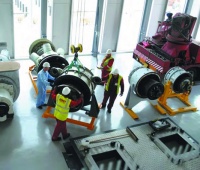Due in part to Labour’s controversial policy of trying to get half of all school leavers into university, the higher education (HE) sector has seen a rapid expansion in the past decade or so, with a raft of new institutions appearing up and down the country.

Yet it has been a rather imbalanced growth, leaving the engineering and physical sciences more or less stagnant. There are many reasons behind this but the net result is that there has been no new engineering department in the UK in more than 20 years – until now.
Founded in 1996 as a true ’greenfield’ institute, Lincoln University has been something of a HE success story, plotting a rapid and upward trajectory through the university league tables. Indeed, The Times Good University Guide described its progression as ’the most dramatic transformation of a university in recent times’.
“Siemens needed to find a university that was willing to take a risk and adventurous enough to deliver an academic course in a different way”
The final piece of the puzzle came in spring 2009, with the proposal to establish a specialist School of Engineering.

For Siemens, the aim was to create a centre specialising in industrial power and energy – a sector that has a large global significance for the company. Currently in the UK there are a small number of specialist Masters-level courses and dedicated research projects in this area, so the company wanted to created something unique.
Siemens has now co-located its product training facility in custom-designed locations within the school. This is aimed at cementing links between Siemens and the university, for both teaching and research.
For the department itself, there was also an opportunity to do things differently from an academic point of view.
Lincoln claims that the BEng and MEng mechanical engineering degrees on offer are ’specifically designed to provide undergraduate engineers with all the skills and creativity they will need to meet the great engineering challenges of the 21st century’.
The first two years of the degrees are organised around the core discipline areas of mechanical engineering, which include design, engineering science and computer-aided engineering.
At the end of the second year, students can choose whether to focus on modern mechanical engineering, or to follow more specialised routes relating to ’power and energy’ or ’control systems’.
Siemens has also offered 12 scholarships for the 2011 intake, covering the entire annual tuition fees, as well as around £2,000 a year towards living costs. There is also the additional opportunity to take paid summer vacation work with the company.
“By almost sharing desks with industry engineers, we can see exactly what skills will be required”
’Engagement is the difference – although it’s not a panacea, it is perhaps the new education model for the 21st century,’ said Stewart.
’The sort of conversations you have with employers and things you hear from industry all the time are that graduates can be incredibly well educated – they can know all of the technical content – but what they’re not necessarily prepared for is the world of work: all of those subtle little things that you pick up by having a job and being employed, like how to communicate and how to network, even down to the brass tacks of health and safety.

’So, by maintaining this very close relationship, first of all we are able to understand exactly what the business needs are – not theoretically, but exactly. By almost sharing desks with industry engineers, we can see exactly what the technological skills are that are going to be required.
’Moving beyond that, there is an opportunity for industry engineers to come and lead touch points within the degree programme that are related to the use of software and employability skills. At the end of this, we have an industry-ready graduate – somebody that can pretty much start contributing to the company from day one and needs a much shorter period in graduate training.’
Now that the school is up and running with both teaching and research, Stewart says that its main long-term aim is to become recognised as a world-class centre for industrial power and energy; using the forthcoming degree in electronic engineering as a springboard.
Jill Stewart
Biography
Head of Lincoln School of Engineering
Education
1997 MEng at Wolfson School of Mechanical and Manufacturing Engineering, Loughborough University
2001 PhD in ’Combustion Diagnostics of a Dual Fuel Engine: An Experimental and Theoretical Study’, Loughborough University
Career
1996 Releaser and scheduler, Caterpillar UK
2000 Industrial trainee, BG Technology
2001 Research and development engineer, Lister-Petter UK
2005 Research associate in the Auto-Propulsion Group, Loughborough University
2007 Research fellow in Regenerative Energy Recovery at Salford University
Q&A School of thought
As a new school, what can Lincoln Engineering do differently from more established centres?
Our academics, by and large, came from Russell Group universities and we toyed with the idea that we could start from a blank piece of paper and find something completely unique and different. It’s not so much the academic content, it was more the industry engagement. With a little university such as Lincoln and a new school of engineering, any possibility is on the table; whereas if you’re in a very big university, it’s like trying to turn around an oil tanker. In contrast, we can be responsive and agile, allowing us to adapt quickly and be very enterprising.
How do you attract and encourage more sixth formers to consider engineering at university?
The problem is a wider one and a perennial one. Engineering is in everything, yet it’s not always that visible – I don’t think the creativity is necessarily obvious. We need to engage with youngsters, probably before they get to sixth form, because, by the time you’re following your A-levels, it’s a bit late. But we’re entering a year where £9,000 tuition fees are coming in for the first time and we’re a new school that doesn’t appear in any league tables. You’d think we’d be struggling but, in fact, we’ve more than doubled our applications this year [September 2012 intake] compared with last year, which was supposed to be the boom year.
Are you targeting female undergraduates specifically?
At the minute, if I was going to be really honest, it’s about getting young people to want to do engineering and focusing on a gender bias is a bit of a luxury in the context of strategic skills gaps in the economy. Ultimately though, I would love to see a lot more women doing engineering and again, I think it’s just about making the profession visible and making it obvious that it isn’t working in a garage or repairing washing machines; it’s something different and distinct.
Is there a danger of over-reliance on one industrial partner [Siemens] and potential conflict of interest when attracting other potential collaborators?
We set ourselves up as a centre for industrial power and energy, so we’re not going to go to a competitor of Siemens and they’re not going to come to us because it is a very competitive sector. Right now, we’re interested in the whole energy question and supply chain, and there’s a lot to exploit there before you would ever reach the end.




Red Bull makes hydrogen fuel cell play with AVL
Many a true word spoken in jest. "<i><b>Surely EVs are the best solution for motor sports</b></i>?" Naturally, two electric motors demonstrably...